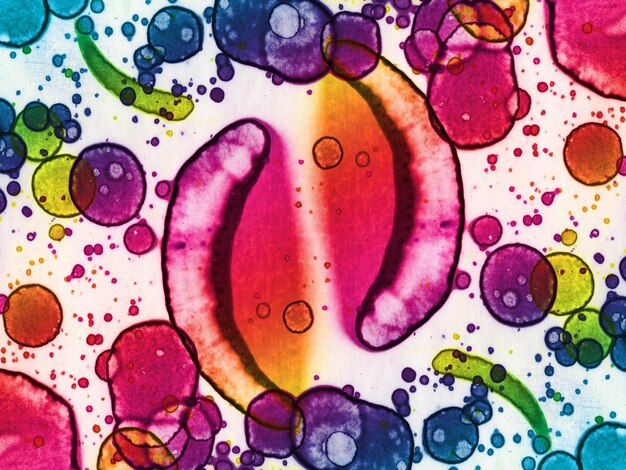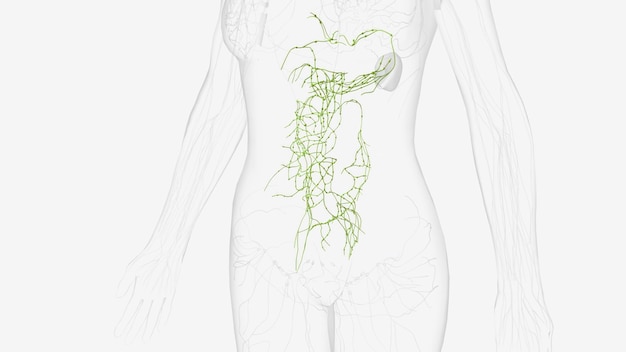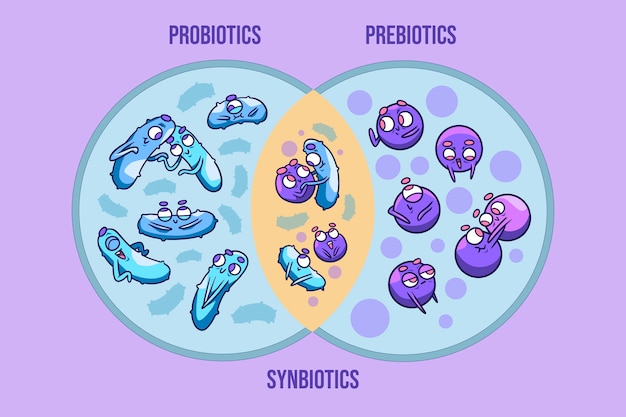The Gut-Brain Connection: How Gut Health Impacts Mental Well-being

The link between gut health and mental well-being is increasingly recognized, with research highlighting the profound influence of the gut microbiome on brain function, mood, and overall mental health through various physiological pathways.
The connection between your gut and your mind might seem unlikely, but the link between gut health and mental well-being: a comprehensive overview reveals a deep and complex relationship. Let’s explore how your gut’s ecosystem influences your mood, cognitive function, and overall mental state.
Understanding the Gut-Brain Axis
The gut-brain axis represents the bidirectional communication network between the gut and the brain. This complex system involves neural, hormonal, and immunological pathways, allowing constant interaction and information exchange between these two vital organs.
The Neural Pathway
The vagus nerve, the longest nerve in the body, directly connects the gut to the brain. It transmits signals in both directions, carrying information about the gut’s state – such as inflammation or nutrient absorption – to the brain.
The Hormonal Pathway
The gut produces many hormones, including serotonin, a key neurotransmitter that regulates mood. Disruptions in gut health can affect hormone production and signaling, impacting mental well-being.
- Gut bacteria synthesize neurotransmitters like serotonin and dopamine.
- These neurotransmitters can influence mood, anxiety, and cognitive functions.
- An imbalance in gut bacteria can lead to decreased neurotransmitter production.

The gut-brain axis highlights the intricate relationship between physical and mental health. Maintaining a healthy gut is essential for supporting overall well-being.
The Role of the Gut Microbiome
The gut microbiome, consisting of trillions of bacteria, fungi, and other microorganisms, plays a crucial role in maintaining gut health. It affects nutrient absorption, immune function, and mental health.
Impact on Immune Function
A significant portion of the immune system resides in the gut. The gut microbiome helps train and regulate the immune response, reducing the risk of inflammation and autoimmune conditions, which, in turn, can affect mental health.
Influence on Mental Health
The gut microbiome influences mental health through various mechanisms, including neurotransmitter production and modulation of the stress response.
- The gut microbiome affects the production of short-chain fatty acids (SCFAs).
- SCFAs have anti-inflammatory properties and can influence brain function.
- Imbalances in the gut microbiome can disrupt SCFA production.
The composition of the gut microbiome can significantly influence both physical and mental health. Dietary changes and lifestyle adjustments impact the gut microbiome and overall well-being.
How Gut Health Affects Mental Well-being
Poor gut health can manifest in various ways, including digestive issues, inflammation, and imbalances in the gut microbiome. These issues can significantly impact mental well-being.
Anxiety and Depression
Studies have linked gut dysbiosis—an imbalance in the gut microbiome—to increased risk of anxiety and depression. This can be due to reduced neurotransmitter production or increased inflammation.
Stress Response
Alterations in gut health can affect the body’s response to stress. A healthy gut can modulate the stress response, reducing the impact of stressors on mental health.

- Gut inflammation can trigger systemic inflammation, affecting brain function.
- The gut microbiome influences the hypothalamic-pituitary-adrenal (HPA) axis, regulating stress.
- Chronic stress can negatively impact the gut microbiome, creating a cycle.
Prioritizing gut health is essential for supporting mental well-being. Addressing imbalances in the gut microbiome through diet and lifestyle changes can improve mental health outcomes.
Strategies for Improving Gut Health
Adopting strategies to improve gut health can positively impact mental well-being. These include dietary modifications, lifestyle adjustments, and targeted interventions.
Dietary Changes
A diet rich in fiber, fruits, vegetables, and whole grains supports a diverse and healthy gut microbiome. Avoiding processed foods, sugars, and artificial sweeteners is also crucial.
Probiotics and Prebiotics
Probiotics are live microorganisms that can help restore balance to the gut microbiome. Prebiotics are non-digestible fibers that feed beneficial gut bacteria.
- Incorporate fermented foods like yogurt, kefir, and sauerkraut into your diet.
- Consume prebiotic-rich foods such as garlic, onions, and bananas.
- Consider taking probiotic supplements to support gut health.
Making informed dietary choices can significantly improve gut health. Focusing on whole, unprocessed foods and incorporating probiotics and prebiotics can support a balanced gut microbiome.
The Gut-Mental Health Connection: Scientific Evidence
Research increasingly supports the connection between gut health and mental well-being. Studies have demonstrated that interventions targeting the gut microbiome can improve mental health outcomes.
Clinical Trials
Clinical trials have shown that probiotic supplementation can reduce symptoms of anxiety and depression. These studies highlight the potential of targeting the gut microbiome to improve mental health.
Animal Studies
Animal studies further support the gut-brain connection. Research has shown that altering the gut microbiome in animals can influence their behavior and cognitive function.
- Studies indicate that the gut microbiome can influence brain structure and function.
- Specific bacterial strains are associated with improved mood and reduced anxiety.
- Further research is needed to fully understand the mechanisms involved.
Scientific evidence underscores the importance of gut health for mental well-being. Ongoing research continues to unravel the complex interplay between the gut microbiome and the brain.
Practical Tips for a Healthier Gut and Mind
Incorporating practical tips into your daily routine can support gut health and mental well-being. These include mindfulness practices, exercise, and stress management techniques.
Mindfulness and Meditation
Practicing mindfulness and meditation can reduce stress and improve gut health. Stress can negatively impact the gut microbiome, so managing stress is essential.
Regular Exercise
Regular physical activity can promote a healthy gut microbiome. Exercise increases microbial diversity and reduces inflammation.
- Practice deep breathing exercises to reduce stress and support gut function.
- Engage in activities you enjoy to boost mood and reduce anxiety.
- Maintain a consistent sleep schedule to support gut health and mental well-being.
Adopting a holistic approach that includes diet, lifestyle, and mindfulness can optimize both gut health and mental well-being. These practices synergistically promote overall wellness.
| Key Point | Brief Description |
|---|---|
| 🧠 Gut-Brain Axis | Communication network between the gut and brain. |
| 🦠 Gut Microbiome | Trillions of bacteria that affect health. |
| 🌱 Probiotics/Prebiotics | Support a balanced gut microbiome. |
| 🧘♀️ Mindfulness | Reduces stress and improves gut health. |
Frequently Asked Questions (FAQ)
▼
The gut microbiome influences neurotransmitter production and the body’s stress response, directly impacting mood, anxiety, and cognitive functions. Imbalances can lead to inflammation, affecting brain health.
▼
Probiotics are live microorganisms that restore balance to the gut microbiome. Prebiotics are non-digestible fibers that feed beneficial gut bacteria, promoting their growth and activity in the gut.
▼
A diet rich in fiber, fruits, vegetables, and whole grains supports a healthy gut microbiome. Fermented foods like yogurt and kefir also contribute beneficial bacteria to the gut.
▼
Yes, stress can negatively impact the gut microbiome. Chronic stress can alter the composition and function of gut bacteria, leading to inflammation and digestive issues, which can affect mental well-being.
▼
Improve gut health by eating a balanced diet, incorporating probiotics and prebiotics, managing stress through mindfulness, exercising regularly, and avoiding processed foods and artificial sweeteners. Consider consulting a healthcare professional for personalized advice.
Conclusion
Understanding the profound link between gut health and mental well-being is crucial for overall wellness. By adopting strategies to improve gut health, such as dietary changes, incorporating probiotics and prebiotics, and managing stress, individuals can positively impact their mental and emotional state, fostering a healthier and happier life.
